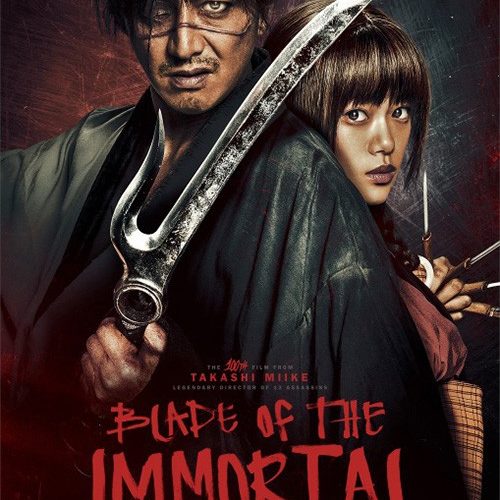Boldly marketed in Japan and abroad as the 100th film of the legendary Takashi Miike, one has to ask if Blade of the Immortal can be appropriately burdened with the weight of a summation of the director’s career? Well, if summation is too grand, is it at least a title representational of his oeuvre fair? For the prolific metteur-en-scene seemingly unable to say no to a project, not really.
Beginning with a black and white prologue — the promise of perhaps some exciting formalist experimentation on Miike’s part — we see Manji (Takuya Kimura) exacting revenge on the bounty hunters who killed his sister. Only after seemingly finishing his duty and being in his last moments on earth, he’s cursed by a witch-like figure, Yaobikuni (Yoko Yamamoto) to not be able to die until he kills 1,000 evil men. The method for cursing him with immortality are magical worms that crawl into his body, reconstructing his body tissue. Don’t be worried, you’ll hear straight-faced mentions of “worms” much throughout the 140 minutes.

We then cut to 50 years later, our societal view expanding to a village that homes a young girl Rin (Hana Sugisaka), who’s been taking up swordplay. The young warrior activity is much to the chagrin of her mother, who’d prefer her to focus on cooking and sewing. Though in an act of narrative efficiency (something that’ll be lacking through much of the film), her family is killed by a group of bloodthirsty rogue samurai.
Thus she seeks the help of Manji to get her revenge, their team-up making the film somewhat akin to Takashi Miike’s True Grit, the revisionist western angle providing a good entryway into the film. The aging gunslinger as samurai mentoring a protege, all to some treatise on violence seems too rich to pass up.
Though with a few too many characters, a bloated runtime, explanatory onscreen text, and a somewhat inconsistent approach to violence, the manga source feels a little too apparent throughout. It’s not strange terrain to Miike, being that in recent years he hasn’t been exactly working against the grain of the Japanese film industry, happily lapping up one property after another. At the same time, the film comes with an unfortunate whiff of self-seriousness, something I’ve never felt while watching any Miike’s more pop films before, no matter how glacially-paced or confrontational they could be.

Similarly, when it comes to form, the action is a little too dependent on the image of a lone ronin slashing through hordes of enemies. There’s wuxia-esque flying through the air, which shows signs of the more buoyant film that could’ve come out of this. Either go full manga spectacular or go full The Sword of Doom; this is a little too stuck in-between.
To return to the question of the Miike summation, Blade of the Immortal is ultimately sturdy but a little unremarkable, enjoyable but somewhat baggy. One could suppose it’s thus representational of a great director already thinking of his next project. Fingers crossed for film #101.
Blade of the Immortal is now in limited release.

